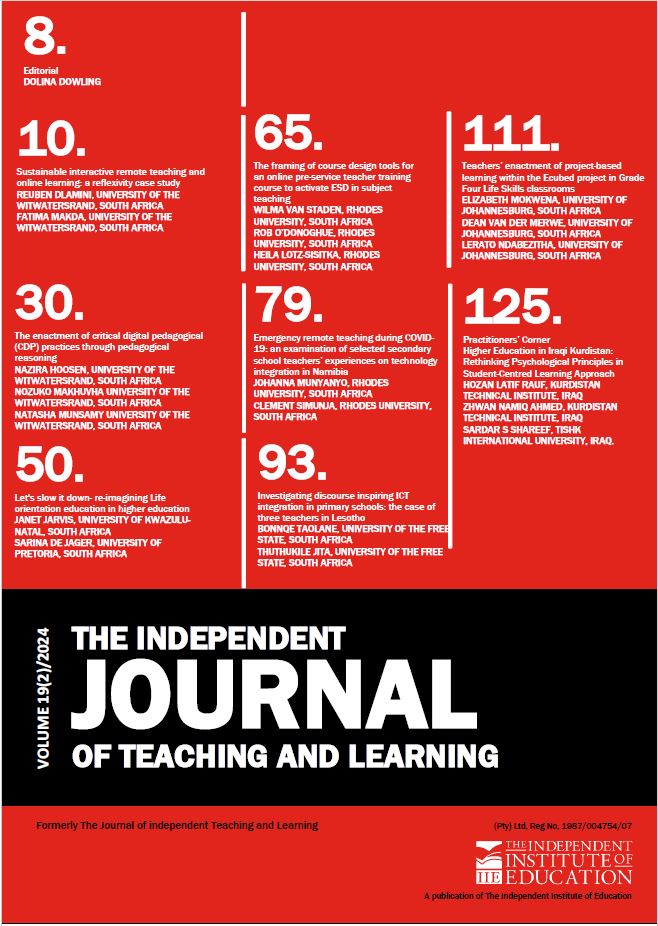Higher Education in Iraqi Kurdistan: Rethinking Psychological Principles in Student-Centred Learning Approach
DOI:
https://doi.org/10.17159/9rkz4093Keywords:
higher education, psychological principles, emissions, social interaction, Kurdistan Region of Iraq (KRI), communication, student-centred learningAbstract
The student-centred approach has become more popular in recent years. The learners' responsibility for learning involves them directly in the learning process and promotes social behaviours, including collaboration, meaningful communication, freedom of choice, and teamwork. Students should develop their knowledge through dialogue, critical thinking, and problem-solving. However, due to various circumstances, teachers may struggle to overcome obstacles while utilizing the student-centred approach in educational settings. This struggle is particularly evident in developing nations like the Kurdistan Region of Iraq (KRI). Despite the regional ministry of higher education implementing rules requiring new instructors to take pedagogical courses before beginning their teaching careers, teachers in KRI cannot hide that it is difficult to grasp all the concepts. This research sheds light on the struggles and opportunities of student-centred learning in KRI. The findings demonstrate that although there is a lack of psychological concepts, instructors attempt to incorporate what they have learned in their pedagogy courses. However, there is no information in the educational curriculum concerning the psychological principles required for student-centred learning. This study suggests that decision-makers investigate this problem and incorporate these ideas into subsequent instructional courses.
References
Agrahari, R. (2016). The nature of educational reform and change: From teacher-centered to student-centered learning. Educational Quest-An International Journal of Education Applied Social Sciences, 7(2), 133-139. http://dx.doi.org/10.5958/2230-7311.2016.00030.1
Ahmed, A. K. (2013). Teacher-centered versus learner-centered teaching style. Journal of Global Business Management, 9(1), 22.
Alexander, P. A. & Murphy, P. K. (1998). The research base for APA's learner-centered psychological principles. Paper presented How students learn: Reforming schools through learner-centered education. https://doi.org/10.1037/10258-001
Ali, S. S. (2019). Problem based learning: A student-centered approach. English language teaching, 12(5), 73-78. http://dx.doi.org/10.5539/elt.v12n5p73
Anderson, G. & Arsenault, N. (2005). Fundamentals of educational research: Routledge: New York.
Chew, S. L., Halonen, J. S., McCarthy, M. A., Gurung, R. A., Beers, M. J., McEntarffer, R. & Landrum, R. E. (2018). Practice what we teach: Improving teaching and learning in Psychology. Teaching of Psychology, 45(3), 239-245. http://dx.doi.org/10.1177/0098628318779264
Chong, C.-H. & Yeo, K.-J. (2015). An overview of grounded theory design in educational research. Asian Social Science, 11(12), 258. http://dx.doi.org/10.5539/ass.v11n12p258
Creswell, J. (2012). Educational Research: Planning Cconducting and Evaluating Quantitative and Qualitative Research, (4th ed.). Pearson Education.
Dole, S., Bloom, L. & Kowalske, K. (2016). Transforming pedagogy: Changing perspectives from teacher-centered to learner-centered. Interdisciplinary Journal of Problem-Based Learning, 10(1), 1. http://dx.doi.org/10.7771/1541-5015.1538
Emaliana, I. (2017). Teacher-centered or student-centered learning approach to promote learning?oJurnaloSosialoHumaniora,o10(2),o59-70. http://dx.doi.org/10.12962/j24433527.v10i2.2161
Huguet, P. & Kuyper, H. (2017). Applying social psychology to the classroom. In P. A. Schutz & R. Pekrun (Eds.), Emotion in education (pp.123-140). Cambridge University Press.
Hurst, B., Wallace, R. R. & Nixon, S. B. (2013). The impact of social interaction on student learning. Reading Horizons, 2013(4), 375-398.
Jaleel, S. (2010). Psychological Principles for e-Learning. Accepted in: 3rd Annual Forum on e-Learning Excellence in the Middle East 2010 - Bringing Global Quality to a Local Context. Online Submission. https://files.eric.ed.gov/fulltext/ED508860.pdf
Kaymakamoglu, S. E. (2018). Teachers' Beliefs, Perceived Practice and Actual Classroom Practice in Relation to Traditional (Teacher-Centered) and Constructivist (Learner-Centered) Teachingo(Noteo1).oJournaloofoEducationoLearning,o7(1),o29-37. http://dx.doi.org/10.5539/jel.v7n1p29
Keiler, L. S. (2018). Teachers’ roles and identities in student-centered classrooms. International journal of STEM education, 5(34), 1-20. https://doi.org/10.1186/s40594-018-0131-6
Lojdová, K. (2019). Socialization of a student teacher on teaching practice into the discursive community of the classroom: Between a teacher-centered and a learner-centered approach. Learning, Culture Social Interaction, 22, 100314. http://dx.doi.org/10.1016/j.lcsi.2019.05.001
Morgan, K. (1970). Sample size determination using Krejcie and Morgan table. Kenya Projects Organization, 38, 607-610.
Motschnig, R., Sedlmair, M., Schröder, S. & Möller, T. (2016). A team-approach to putting learner-centered principles to practice in a large course on Human-Computer Interaction. Paper presented at the 2016 IEEE Frontiers in Education Conference (FIE), (pp. 1-9). IEEE. doi:10.1109/FIE.2016.7757576
Omer, M. A., Asaad, M. M., Sofi-Karim, M., Kakakhan, M. B., Al-Zangana, S., Mohammed, O. A., . . . Mohamad, K. K. (2021). Academic staff's attitude toward the Bologna process and the new pedagogy in the University of Garmian. ZANCO Journal of Pure Applied Sciences, 33(1), 68-76.
Rauf, H. L. & Shareef, S. S. (2022). Reconsidering architectural education based on Freire’s ideas in Iraqi Kurdistan. Educational Philosophy Theory, 54(13), 2243-2255. http://dx.doi.org/10.1080/00131857.2022.2130045
Sawant, S. P. & Rizvi, S. (2015). Study of passive didactic teacher centered approach and an active student centered approach in teaching anatomy. International Journal of Anatomy Research, 3(3), 1192-1197. http://dx.doi.org/10.16965/ijar.2015.147
Schwartz, N., Click, K. & Bartel, A. (2023). Educational Psychology: Learning and Instruction. InternationaloHandbookoofoPsychologyoLearningoTeaching,o357.ohttp://dx.doi.org/10.1007/978-3-030-28745-0_67
Serin, H. (2018). A comparison of teacher-centered and student-centered approaches in educational settings. International Journal of Social Sciences Educational Studies, 5(1), 164-167.
Tariq Khalid, A. (2022). Teacher Motivation towards the Implementation of Bologna Process in Erbil-Kurdistan. International Journal of Social Sciences Educational Studies, 9(3), 83-92.
Wulf, C. (2019). “From teaching to learning”: Characteristics and challenges of a student-centered learning culture. In Inquiry-based learning–Undergraduate research: The German multidisciplinary experience 7-55.
Zacharis, N. Z. (2010). Innovative assessment for learning enhancement: Issues and practices. Contemporary Issues in Education Research, 3(1), 61-70.
Published
Issue
Section
License
Copyright (c) 2024 The Independent Journal of Teaching and Learning

This work is licensed under a Creative Commons Attribution 4.0 International License.






.png)